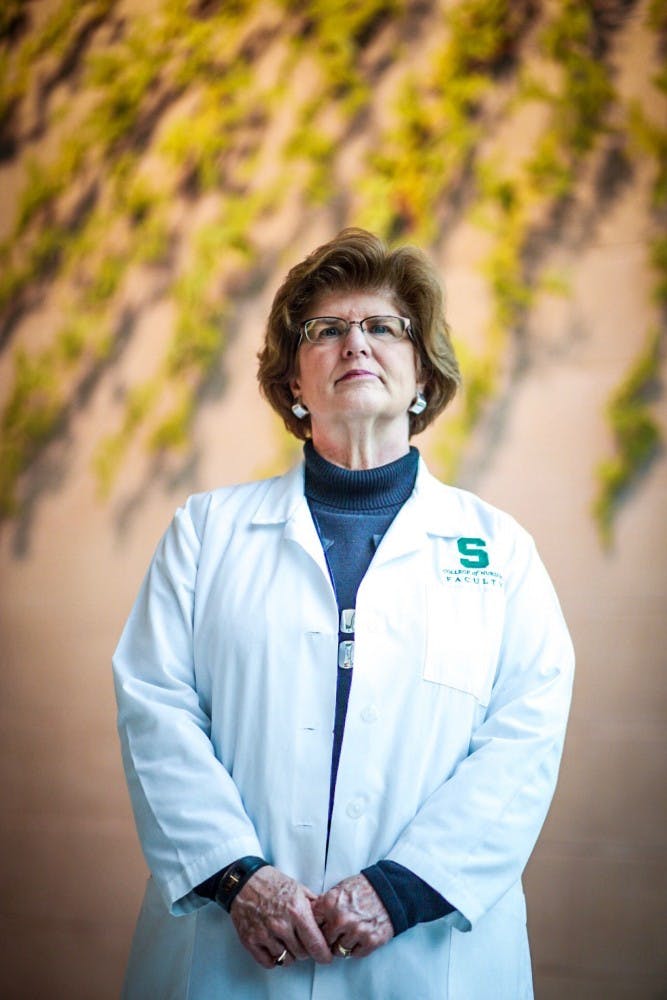According to the National Human Trafficking Hotline, 943 human trafficking cases have been reported in the state of Michigan from 2007 to June 2017. 136 of those cases have been reported so far this year – and those are just the statistics of cases actually reported.
Michigan healthcare professionals took a step towards increasing reporting and minimizing trafficking in April by creating a training that teaches about human trafficking, and requiring professionals to take that training to get or renew a new license or registration.
According to The Health Law Center’s website, the prevalence of human trafficking has reached alarming levels in the U.S., and this is an effort to address the widespread crisis in Michigan.
MSU Professional Program Coordinator Kathy Forrest said 138 individuals in the College of Nursing have completed the online course for human trafficking since the requirement has been administered.
“Human trafficking is very prevalent in the United States. It is a form of human slavery, human bondage. It’s a public health issue for the individuals who are being trafficked. It is often an underground activity that is spread by social media and affects the vulnerable among us,” Forrest said.
Professionals who are required to satisfy the trainings include nurses, counselors, physicians, social workers and massage therapists.
In 2015 Michigan ranked number two in the nation for human trafficking sex trade.
The criteria that health professionals need to satisfy for their training include: types and venues of trafficking in the United States and in Michigan, how to identify victims in health care settings, how to identify warning signs of trafficking and what resources are available for reporting.
“Healthcare providers may have access to these victims of trafficking in healthcare settings and they need to be aware of what the warning signs are of human trafficking so that they can help break that cycle,” Forrest said.
Forrest said their training is for nurses to successfully recognize any signs and be able to address the issue in their own area.
Some signs of a human trafficking include unexplained injuries, an individual who comes to a healthcare visit and isn’t allowed to speak, a fictional story about an injury and an individual who seems shy or mistrusting.
“Victims of human trafficking are vulnerable individuals. They may be seeking approval, they may lack self-esteem,” Forrest said.
Forrest said there are a number of risk factors that may make an individual vulnerable to be trafficked and they become sought after by perpetrators.
“For years and years and years there have been tons of cases and the reason is because people don’t know it,” said MSU Clinical Associate Professor of Osteopathic Specialties Alan Janssen.
Janssen said he has given educational sessions on trafficking many times and people would come up afterwards to say that they’ve seen these types of cases, but they weren’t aware of the signs.
“If you’ve never seen it or you don’t understand it, you won’t be able to recognize it so that’s why training is so important,” he said. “By recognizing it and being able to educate the victim then you could potentially get them out of their abusive situations.”
Janssen said he has seen these sorts of cases plenty of times as the director of Genesys Regional Medical Center and just giving a person the resources and education to identify trafficking could help a victim out of a dangerous situation.
“The goal is to increase the awareness of the public health issue and to educate nurses and other healthcare professionals to address the problem,” Forrest said.
Support student media!
Please consider donating to The State News and help fund the future of journalism.
Forrest said the ultimate goal for professionals would be to disrupt the supply and demand chain because it's a criminal enterprise.
“If the demand is disrupted than there will not be the need to have vulnerable individuals in these situations,” she said.
Janssen said the biggest problem is that there aren't good systems in place such as safe houses for treatment or rehabilitation of victims.
“I’d like to increase awareness to the point that we have better treatment resources,” Janssen said.
Discussion
Share and discuss “College of Nursing begins program to fight human trafficking” on social media.







